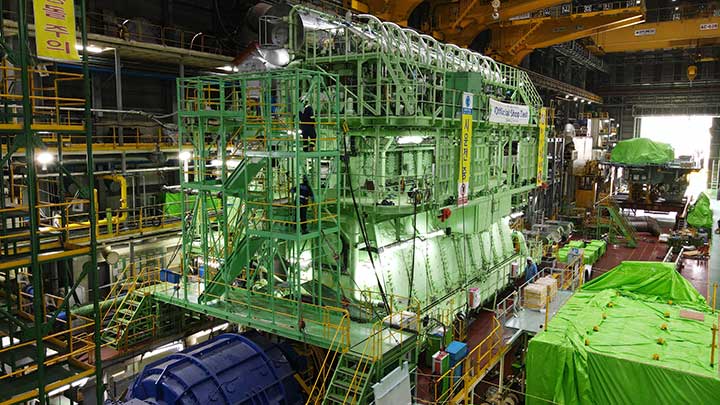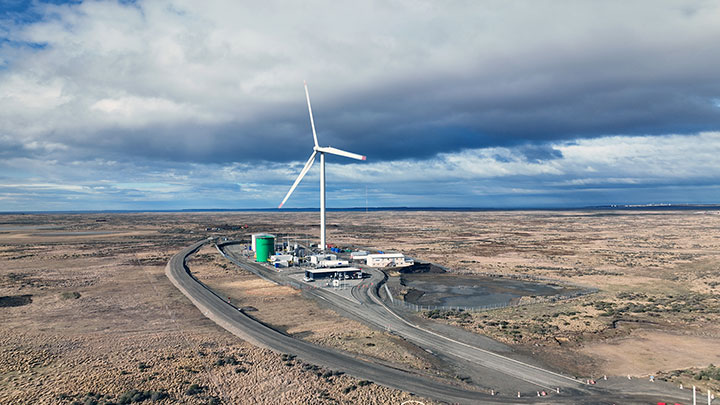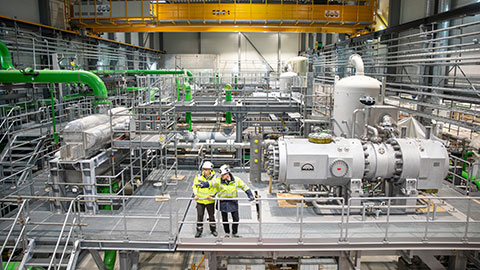MAN Energy Solutions: Pioneering Decarbonization
At MAN Energy Solutions, we pioneer solutions for the world’s largest industries, engineering change for the better. For more than 250 years, we have brought about some of the most impactful innovations in advanced engineering and complex systems always considering a challenge within the larger context and searching for solutions that advance sustainable progress for all.
This experience has prepared us well for what is, without a doubt, our biggest challenge yet: Together with our customers, we are determined to make the fight against climate change the future of our business growth. Catering to sectors that are essential to the world economy, we offer systems to bring down emissions that are considered hard to abate.
We are radically rethinking the status quo and our own product portfolio, dedicating ourselves to being pioneers of decarbonization in shipping, energy and industrial production. From future-facing key technologies to industry-leading digital solutions and a continuously developing core portfolio – we have the experience, the technology and the passion to get this job done.
We have the opportunity to decarbonize industries that are crucial for the world economy. That’s why we get out of bed every morning.
Our decarbonization mission in figures
Together with our customers, we are determined to make the fight against climate change the future of our business growth. To achieve net zero emissions by 2050, we must reduce emissions by two thirds in this decade.
Frequently asked questions
What is decarbonization?
Why is decarbonization important?
As decarbonization is directly linked to climate change, it helps to reduce the temperature rise and other casualties related to the emission of greenhouse gases. By integrating decarbonization into your workflows, you contribute to lowering emissions, and work more sustainably.
What are decarbonization benefits?
Benefits of decarbonization are:
- Reduction of greenhouse gases
- Improving energy efficiency
- Reliance on renewable energies that won’t vanish in the future
- Enhancement of your reputation and brand image
How does decarbonization work?
Decarbonization works differently depending on the decarbonization strategy and the circumstances. Some industries work best with alternative fuels in engines, like methanol or ammonia. Others use solar panels or wind energy directly. Generally speaking, you substitute fossil fuel with renewable energy. Most of the time, that’s done step by step, continuously reducing the emissions of greenhouse gases until you don’t produce any.
What is decarbonization technology?
Examples of decarbonization technology are direct electrification, green hydrogen, Power-to-X and heat pumps.
Green Hydrogen, for example, is crucial for decarbonization. It has the possibility of becoming the main future fuel for ships or power plants.

Decarbonization in the industry
MAN Energy Solutions offers dedicated technologies for the different industries.
Decarbonization in shipping can be achieved through the use of synthetic fuels generated from renewable energy sources.
For decarbonization in the energy sector, Power-to-X is a common example, as well as low-emission engine technologies such as combined heat and power plants.
Decarbonization in the industrial sector is especially connected to carbon capture and storage (CCS). MAN Energy Solutions provides technologies for small- and large-scale industrial plants to reduce emissions
Articles about decarbonization with MAN Energy Solutions
Learn more about how MAN Energy Solutions pursues decarbonization.
-

Methanol fueled ships
Sustainable shipping starts now. Find out more about the first large-scale engines for container ships run on green methanol.
-

Haru Oni e-fuels
The Haru Oni demonstration plant could pave the way for a viable alternative to fossil fuels: It produces synthetic e-fuels from hydrogen that can help the fight against climate change. MAN Energy Solutions provided the e-methanol reactor to the plant.
-

Esbjerg Heat Pump
How a seaport town in Denmark is decarbonizing district heating with seawater and large-scale industrial heat pumps.
Our innovative portfolio for your decarbonization
Our portfolio helps customers reduce emissions, use energy more efficiently, and leverage green fuel alternatives. With a wide range of key future technologies, industry-leading digitalization services, and a broad portfolio of products made to last, we are well-equipped to provide sustainable answers to today’s climate challenges.
Read about our latest developements
Decarbonization is a multifaceted topic. Learn more about the newest decarbonization processes and strategies, and how MAN Energy Solutions is contributing to a green, carbon-neutral future.
Car Carriers Stir Methanol Engine Demand
China Merchants Heavy Industry has ordered 2 × MAN B&W 7S60ME-LGIM (-Liquid Gas Injection Methanol) engines in connection with the construction of 2 × 9,300 ceu (car equivalent units) PCTCs for China Merchants Energy Shipping (CMES). The business represents a number of firsts, including the first order globally for the S60ME-LGIM variant, the first methanol-fuelled engine for a PCTC, and the first Chinese-built methanol engine.
The engines will feature MAN Energy Solutions’ proprietary EGR (Exhaust Gas Recirculation) system. Engine manufacturer, CSE, will construct the engines in China with respective vessel delivery set for 2025 and 2026; the order also contains an option for an additional four vessels.
Bjarne Foldager, Head of Two-Stroke Business, MAN Energy Solutions, said: “Interest in using methanol in ocean-going vessels is at an all-time high, especially in the container vessel segment but also in the vehicle-transport sector whose main players are moving to expand capacity driven by very strong, Chinese car sales, and to renew their fleets in response to new emission regulations. Thus, with this order, CMES is simultaneously expanding its business and improving its sustainable profitability. While LNG has been the most popular alternative fuel within the PCTC segment, CMES is one of the first movers to methanol, which we expect will figure prominently as a future fuel in the maritime energy transition across all vessel segments.”
Thomas S. Hansen, Head of Promotion and Customer Support, MAN Energy Solutions, said: “The 110 ME-LGIM engines ordered and more than 400,000 running hours on methanol already recorded at sea show the potency of our methanol concept. Indeed, in response to the increasing interest in methanol-powered engines, we recently expanded our portfolio with the addition of S60-, G60- and G45-LGIM variants such that the propulsion power of our methanol portfolio now spans across all large merchant-marine vessel applications such as container vessels, bulk carriers, tankers, and general cargo vessels like PCTCs.”
Documents
-
PR China Methanol Milestone_EN
Contact
Nils Søholt
Trade Press Marine
Group Communications & MarktingMAN Energy SolutionsTeglholmsgade 412450 Copenhagen SVDenmark
nils.soeholt@man-es.com t +45 33 85 26 69Available languages
- DE ·
- EN
